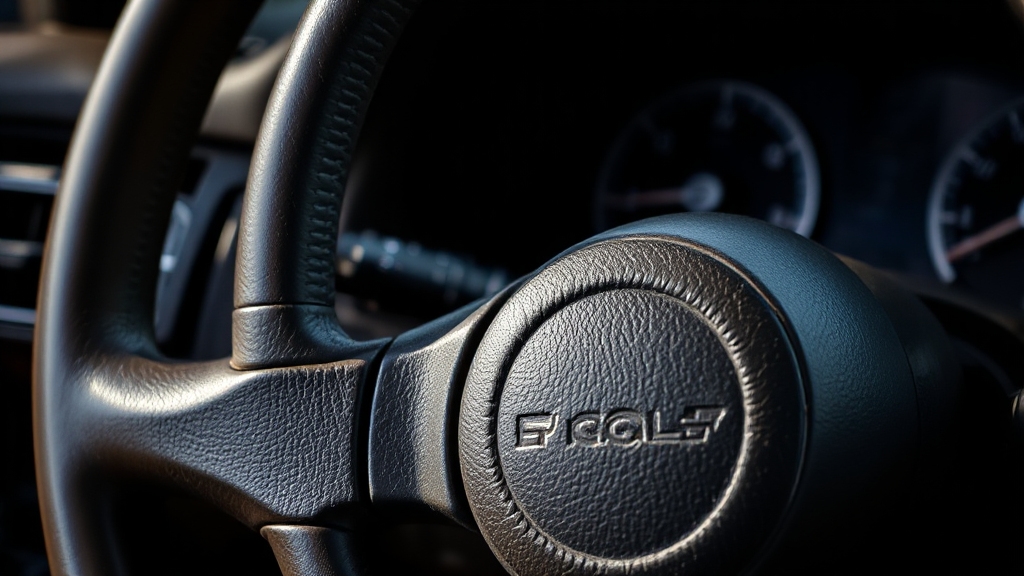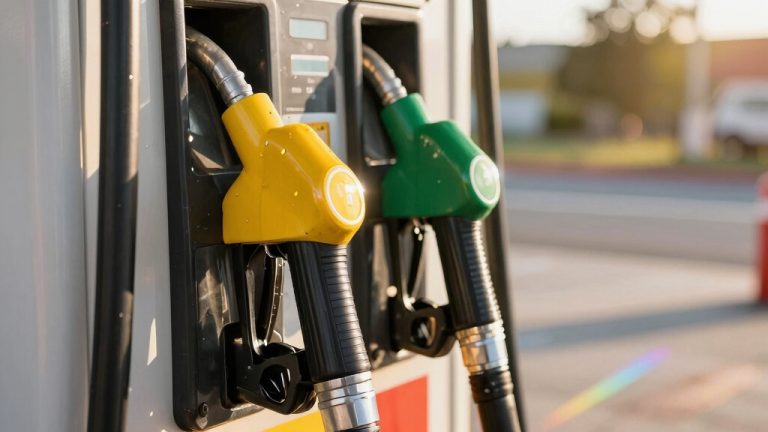If your car’s making noise when you turn, it’s likely a sign of trouble in the power steering system, suspension, or CV joints. You might hear whining from low or contaminated power steering fluid, clunking from worn ball joints or tie rods, or clicking from damaged CV joints. Uneven tire wear or misaligned wheels can also amplify sounds. Check these components pronto. Stick around to uncover deeper insights into pinpointing and fixing the issue.
Key Takeaways
- Worn outer CV joints can cause clicking or popping sounds during sharp turns.
- Damaged ball joints may produce clunking noises when turning the steering wheel.
- Low or contaminated power steering fluid can lead to whining or grinding sounds.
- Worn wheel bearings often create soft grinding noises while turning.
- Misaligned wheels or uneven tire wear can result in humming or vibrations.
Power Steering System Challenges
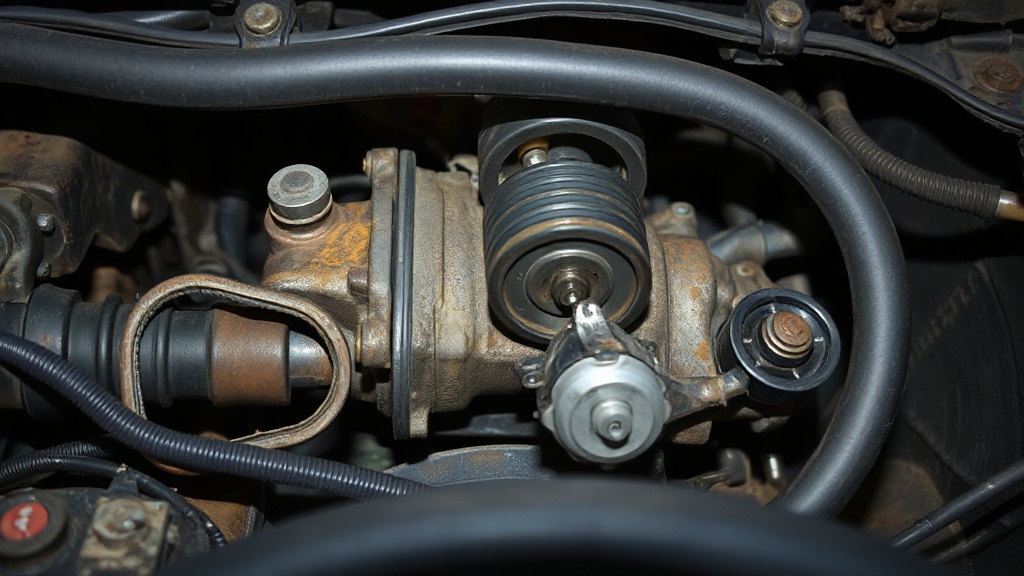
When you turn the steering wheel and hear an unusual noise, the issue might stem from your car’s power steering system. Low fluid levels can cause increased friction, leading to distinct whining or grinding sounds.
Unusual noises while steering often indicate power steering issues. Low fluid levels can create friction, resulting in noticeable whining or grinding sounds.
If the fluid’s contaminated with debris, you’ll notice harsher noises due to added resistance. Using the wrong fluid type mightn’t meet system specs, triggering performance hiccups and noise. Regular maintenance of components, like ensuring proper filtration of contaminants, can help mitigate these issues with power steering fluid.
Leaks reduce fluid, amplifying these issues, while air bubbles in the system disrupt flow, creating cavitation and vibrations. Ignoring these noises can lead to imminent pump failure and more severe steering problems over time.
Check for a worn power steering belt; if it’s loose or slipping, you’ll hear a persistent whine. Misaligned pulleys or incorrect tension can also contribute.
Address these promptly—regular fluid checks and belt inspections can prevent escalating noise problems.
Steering Component Wear Issues
As you turn your car’s steering wheel, unusual noises might point to wear in critical steering components. Clunking or grinding could signal a worn steering rack, making steering stiff or unresponsive due to aging or contamination.
Knocking sounds at low speeds often indicate tie rod wear from heavy use or rough roads, risking steering precision. Replacing worn tie rod ends with durable options like MOOG steering components can restore precise steering and eliminate noise.
Listen for clicking from the steering shaft’s U-joints, a sign of joint or bearing damage, or clunks from ball joints caused by heavy loads, impacting handling. Additionally, a groaning noise while turning may suggest power steering pump failure, indicating the need for immediate inspection or replacement.
Excessive clearance in steering gear, due to loose mounts or worn sleeves, can also cause knocking.
Don’t delay—replace or adjust these components to restore performance and ensure safety. Regular inspections can prevent these issues from worsening.
Suspension and Linkage Concerns
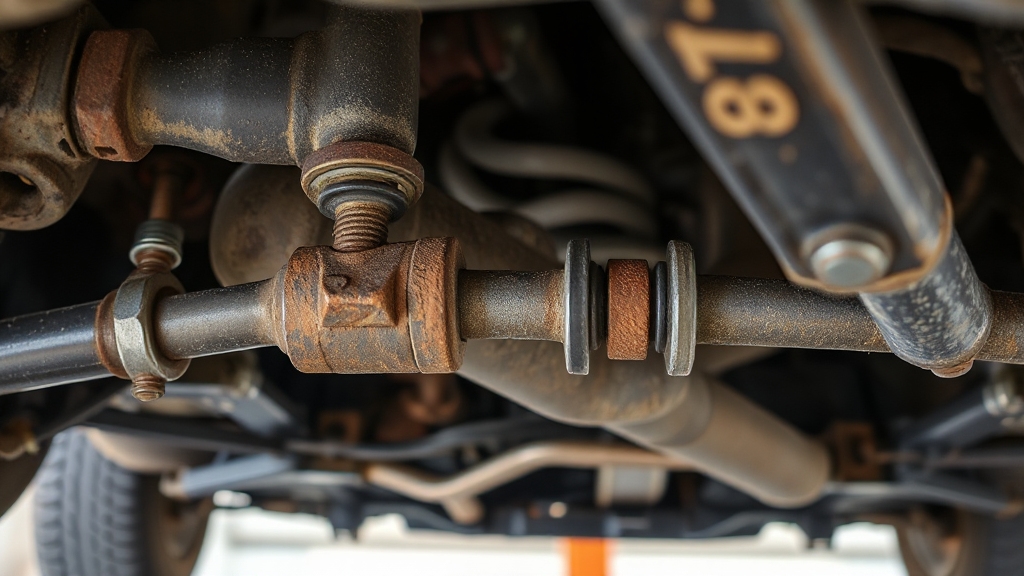
If you hear unusual noises while turning your car, don’t overlook the suspension and linkage components as potential culprits. Worn-out ball joints can cause clunking as they fail to pivot smoothly between steering knuckles and control arms. Loose sway bar links might produce rattling or clunking, compromising stability.
Dry control arm bushings often squeak, while a faulty strut bearing plate can create front-end noise. Additionally, damaged tie rods can lead to erratic steering and clunking noises during turns. Using a high-quality lubricant like those from synthetic oil brands can sometimes help reduce friction and noise in these components.
Check out common issues and symptoms below:
| Component | Noise/Symptom |
|---|---|
| Sway Bar Links | Clunking, increased body roll |
| Ball Joints | Clunking, steering instability |
| Control Arm Bushings | Squeaking, creaking |
Perform a visual inspection or driving test to isolate the noise. If you’re unsure, consult a mechanic for a precise diagnosis and timely repair.
Tire and Wheel Complications
Beyond suspension and linkage issues, you should also examine tire and wheel complications as a source of noise when turning your car. Tires and wheels can generate distinct sounds due to design, wear, or alignment problems. Listen for humming or grinding that changes with speed or direction—it’s often a clue.
Visualize these potential culprits:
- Aggressive tread patterns compressing air, roaring as you turn.
- Uneven tire wear creating a whirring hum on rough roads.
- Misaligned wheels causing vibrations, amplifying noise through the chassis.
- Worn wheel bearings grinding softly, especially during lane changes.
- Studded winter tires clattering with every sharp corner.
Check tread depth, rotate tires regularly, and ensure proper alignment. Maintaining correct tire pressure can also help prevent uneven wear and reduce noise. Correct tire pressure is essential for optimal performance.
Don’t ignore these signs—address them to restore a quiet, smooth ride. Additionally, ensuring proper airflow to the engine can indirectly affect vehicle performance and noise levels, as a clogged filter may strain components. Engine airflow performance is a key factor in maintaining overall vehicle efficiency.
CV Joints and Axle Problems
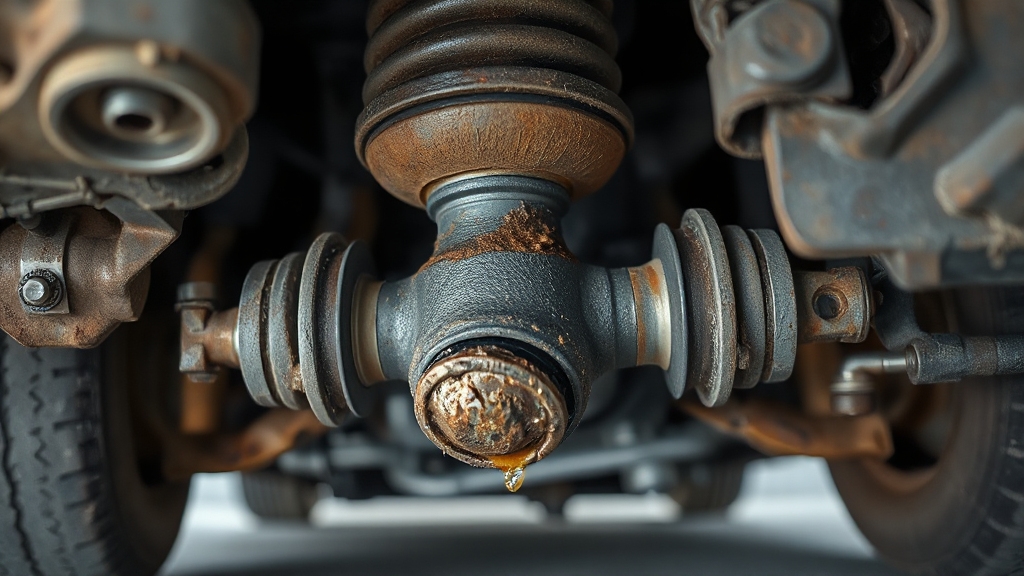
Have you noticed a clicking or popping sound when making sharp turns? That’s a classic sign of worn outer CV joints. The noise often gets louder on the side opposite your turn direction—turning left means the right joint’s likely failing.
Hearing a click or pop during sharp turns? It’s a telltale sign of worn outer CV joints, often louder on the opposite side.
Torn CV boots allow grease to escape, letting dirt and moisture in, accelerating wear. If you hear clunking during acceleration or deceleration, the inner CV joint might be the culprit. Regular inspection of the boots can help catch tears early and prevent further damage to the joint.
Check for grease on rims or suspension; it signals boot damage. Vibrations at higher speeds can also point to joint issues. Ensuring proper lubrication with high-performance synthetic oil can help reduce wear on these components over time.
Don’t ignore these symptoms—progressive wear risks complete axle failure, losing power to your wheels. Inspect boots regularly and replace damaged axles promptly to avoid costly repairs.
Frequently Asked Questions
Could Weather Affect Car Noises When Turning?
Hey, you might wonder if weather can impact car noises when turning. Absolutely, it can! Cold weather thickens lubricants, causing squeaks due to poor lubrication. It also lowers tire pressure, affecting handling and sound.
Plus, frigid temps stiffen components like bushings, leading to creaks, and increase friction in steering systems, producing groans. Don’t ignore temperature fluctuations; they can amplify these issues.
Check your vehicle regularly to mitigate weather-related noises.
Do Engine Mounts Cause Turning Noises?
Hey, let’s tackle whether engine mounts cause turning noises. Typically, they don’t. Engine mounts handle vibrations and clunking during acceleration or gear shifts, not steering maneuvers.
If you’re hearing noises while turning, check your suspension or steering components instead. Worn bushings, joints, or misaligned wheels are more likely culprits.
Inspect these areas thoroughly, and if you’re unsure, get a mechanic to diagnose the issue for precise repairs.
Can Brake Issues Create Noise During Turns?
Hey, you’d think brakes are just for stopping, right? Ironically, they can scream for attention when you least expect it!
If you’re hearing odd noises during turns, check for brake issues. Worn pads might grind, lack of lubrication can cause friction, and warped rotors could vibrate.
Don’t ignore wear indicators scraping or improper installations. Inspect your brakes meticulously; pinpoint these culprits before they turn a simple drive into a noisy nightmare!
Is Steering Column Damage Causing Noise?
Hey, let’s delve into whether steering column damage is causing that noise. Check for worn universal joints—they often squeak or click when turning.
Listen for grinding or knocking, as these could signal loose components or dry bearings. You’ll likely feel difficulty steering or a binding wheel if damage exists.
Don’t ignore this; get a mechanic to inspect and possibly lubricate, tighten, or replace parts for safety.
Does Dirt in Components Make Turning Noisy?
Like a silent thief, dirt sneaks into your car’s components, wreaking havoc. You’re dealing with a real issue if dirt infiltrates CV joints, hub assemblies, or power steering fluid. Inspect those protective boots for tears; they’re your first defense. Check bearings for grit that grinds away at smooth turns.
Don’t ignore contaminated fluid—flush it if needed. Stay proactive, and you’ll keep those noisy gremlins at bay with regular maintenance.
Don’t Let Noisy Turns Lead to Bigger Problems
If your car’s makin’ noise when you turn, don’t ignore it. These sounds often signal issues in your power steering, suspension, or CV joints. Did you know that over 30% of vehicles over five years old develop steering component wear, leadin’ to noisy turns? Get a diagnostic check pronto—pinpoint the fault with a technician. Address it early to avoid costly repairs and keep your ride smooth and safe on every corner.

